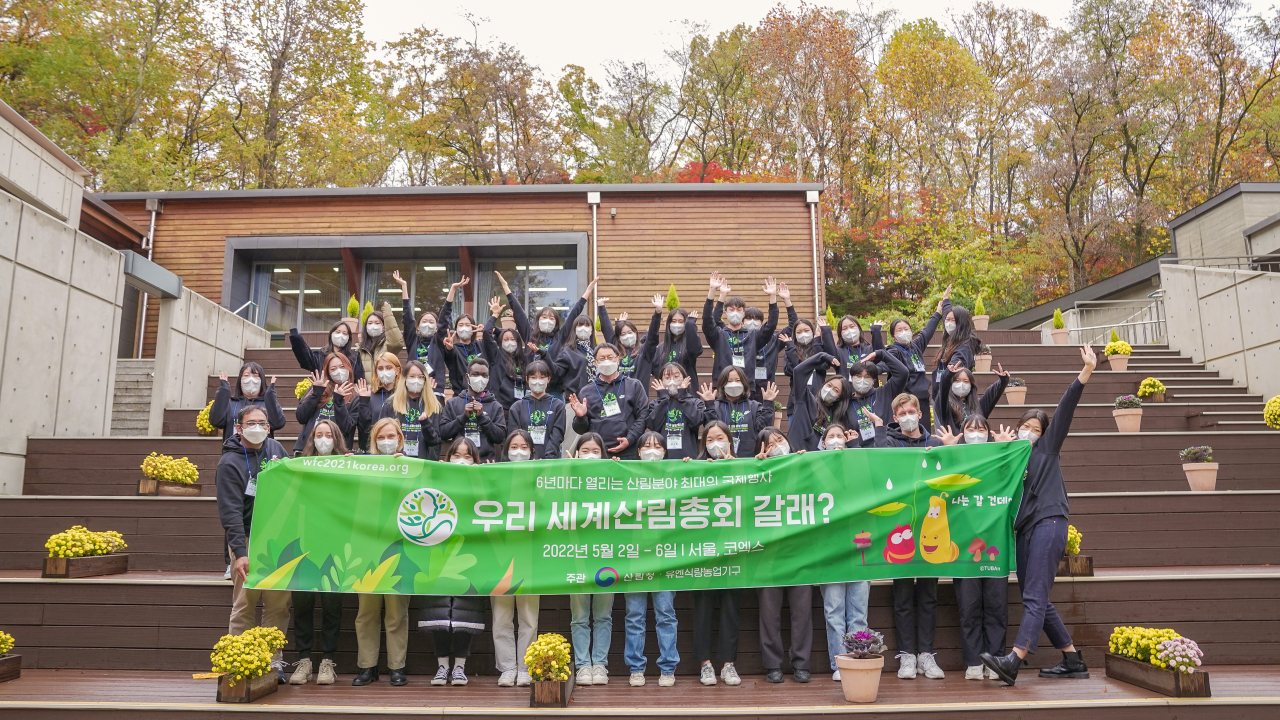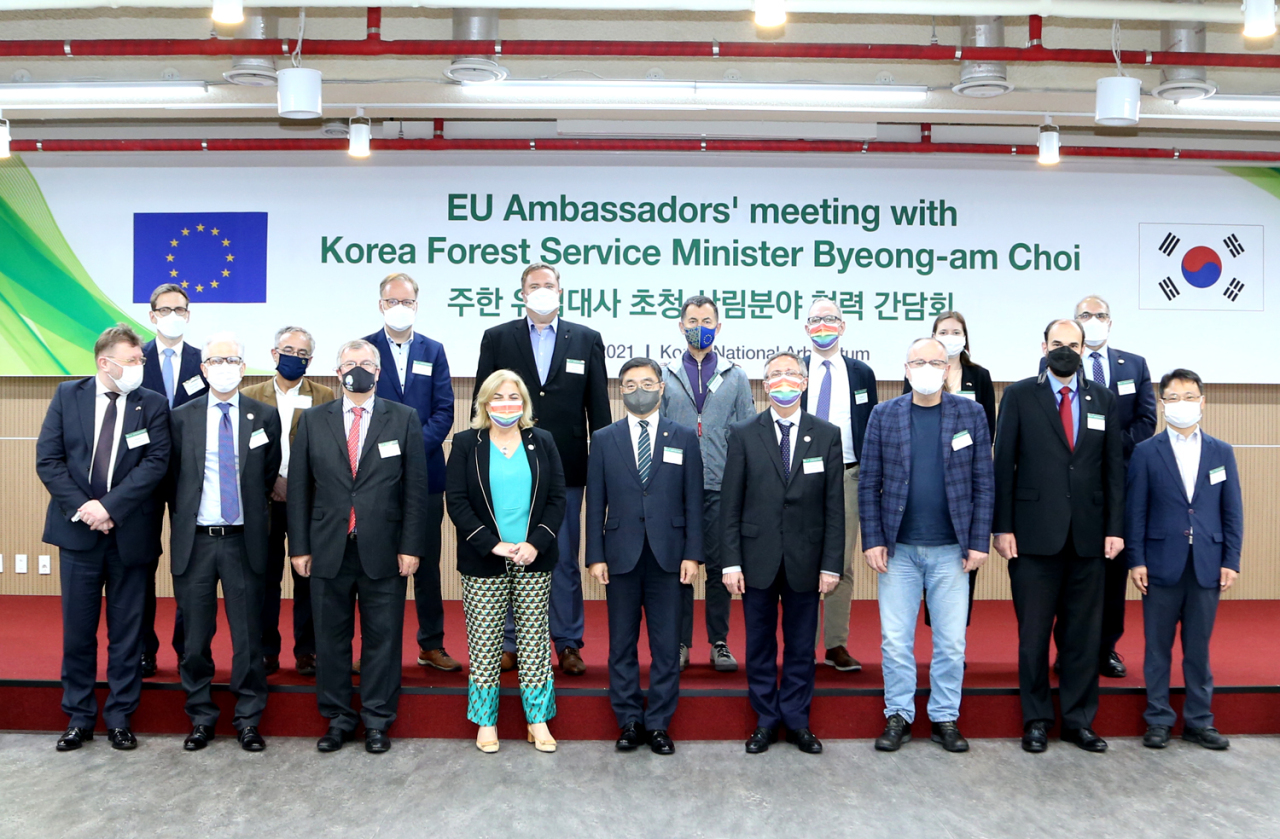World Forestry Congress kicks off its 5-day run in Seoul
By Shim Woo-hyunPublished : May 1, 2022 - 17:08


The World Forestry Congress, the world‘s largest gathering of foresters, kicked off its five-day run in Seoul on Monday. The 15th edition of the WFC will be running from Monday through Friday at Coex in Gangnam.
The WFC is the most influential global forestry gathering, held every six years under the auspices of the Food and Agriculture Organization of the United Nations.
It’s the first time the WFC has been held in South Korea, and it is also the first time in 44 years that the congress is being held in the Asia-Pacific region. It was last hosted in the region by Indonesia in 1978.
The congress is designed to allow people from the world’s forestry sector to strengthen international cooperation with forest supporters and related partners. The event has also functioned as a forum that provides participants with opportunities to exchange views and experiences on all aspects of forestry and the environment. By sharing expertise and experiences, the event aims to help identify the actions required to solve pending issues across the world.

Park Eun-sik, director general of international affairs bureau at the Korea Forest Service, said “(The government) has put its utmost efforts into the congress over the last two years, for which the country may not get another chance to host at another time.”

This year‘s congress is anticipated to be the largest ever, with the participation of around 10,000 people, including government officials, members of international organizations, civic activists and academics from over a total of 143 countries.
The KFS estimates about 2,000 participants will visit from overseas. The number of local participants who pre-registered is about 5,300 so far.
Distinguished guests from abroad include United Nations Secretary-General Antonio Guterres. The leaders of international organizations, including the Food and Agriculture Organization of the United Nations, the Global Environment Facility and the International Renewable Energy Agency, will be also joining the congress. Forest and related ministries from more than 40 countries will attend the event to discuss policies regarding forests and the environment.
Under the theme of “Building a Green, Healthy and Resilient Future with Forests,” the latest edition of the congress will offer a unique opportunity for the global forestry community to consider the current state and future of world forestry, particularly in the context of global climate change, according to the KFS.
The event will work as a place to discuss relevant measures to achieve the sustainable development goals. High-level meetings and special events throughout the congress will also become venues for debate on pending challenges such as global climate change and the COVID-19 pandemic.
The congress has prepared six sub-themes to address the most important current issues concerning forests, through which it will address the importance of restoring and preserving forests and the ways forestation can play its part in achieving carbon neutrality and responding to climate change.
The six sub-themes include, Turning the tide: Reversing deforestation and forest degradation; Nature-based solutions for climate change adaptation and biodiversity conservation; The green pathway to growth and sustainability; Forests and human health: Revisiting the connections; Managing and communicating forest information, data, and knowledge; and Forests without boundaries: Enhancing management and cooperation.
During the event, South Korea will also promote its experiences of reforestation to attendees from all over the world.
According to the KFS, South Korea’s successful history of reforestation has already been recognized worldwide. The country’s reforestation since the Korean War, in particular, is regarded by many international organizations as one of the most successful initiatives of its kind.
Before 1970, forests were destroyed as the country used trees as its main natural resource. The destruction of forests in the country consequently brought about avalanches, floods and other disasters.
As more people began noticing the importance of forests, the government stepped up.
The government took initiatives and supported reforestation through various policies. The government analyzed the survival rates of trees in different regions to create a better tree-management system. Illegal logging was cracked down on. The government provided incentives to public officers based on how many trees they planted and began introducing eco-friendly policies to develop a better environment for tree growth. To prevent slash-and-burn agriculture, the government also provided new settlements and jobs to the farmers.
After decades of effort, South Korea was able to restore many forests across the country. A 2019 UN Food and Agriculture Organization report showed that South Korea had the highest rate of increasing forest stock in the Asia-Pacific region between 1990 and 2015.
South Korea‘s successful reforestation history was recognized worldwide, and the KFS started to share its reforestation know-how. In the earlier stage, the country shared its know-hows with Mongolia and China, but now, the country is handing down reforestation techniques to many more countries, including Indonesia, Vietnam, Myanmar and other Southeast Asian countries, as well as countries in Central Asia, South America and Africa.
Prior to hosting the WFC this year, South Korea also held a series of forest-related international congresses, such as the IUFRO World Congress in 2010, the UNCCD Congress in 2011, and the International Wildland Fire Conference in 2015.
Park said South Korea would do its best to successfully host the congress, adding that the congress will help the country strengthen its global leadership in the forestry sector.





![[From the Scene] Monks, Buddhists hail return of remains of Buddhas](http://res.heraldm.com/phpwas/restmb_idxmake.php?idx=644&simg=/content/image/2024/04/19/20240419050617_0.jpg&u=20240419175937)









![[From the Scene] Monks, Buddhists hail return of remains of Buddhas](http://res.heraldm.com/phpwas/restmb_idxmake.php?idx=652&simg=/content/image/2024/04/19/20240419050617_0.jpg&u=20240419175937)

![[KH Explains] Hyundai's full hybrid edge to pay off amid slow transition to pure EVs](http://res.heraldm.com/phpwas/restmb_idxmake.php?idx=652&simg=/content/image/2024/04/18/20240418050645_0.jpg&u=20240419100350)

![[Today’s K-pop] Illit drops debut single remix](http://res.heraldm.com/phpwas/restmb_idxmake.php?idx=642&simg=/content/image/2024/04/19/20240419050612_0.jpg&u=)